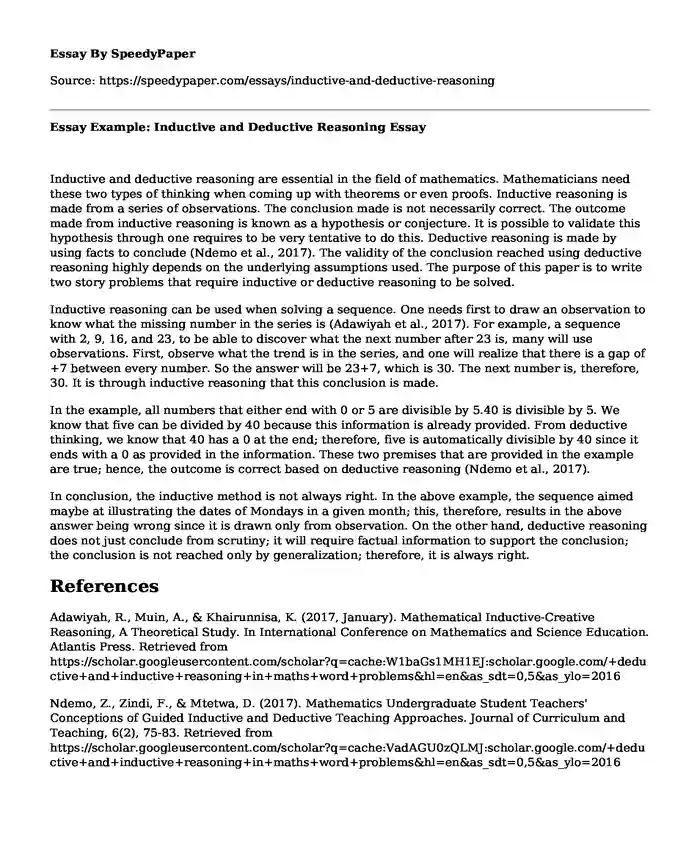
| Type of paper: | Course work |
| Categories: | Knowledge Intelligence Mathematics |
| Pages: | 2 |
| Wordcount: | 484 words |
Inductive and deductive reasoning are essential in the field of mathematics. Mathematicians need these two types of thinking when coming up with theorems or even proofs. Inductive reasoning is made from a series of observations. The conclusion made is not necessarily correct. The outcome made from inductive reasoning is known as a hypothesis or conjecture. It is possible to validate this hypothesis through one requires to be very tentative to do this. Deductive reasoning is made by using facts to conclude (Ndemo et al., 2017). The validity of the conclusion reached using deductive reasoning highly depends on the underlying assumptions used. The purpose of this paper is to write two story problems that require inductive or deductive reasoning to be solved.
Inductive reasoning can be used when solving a sequence. One needs first to draw an observation to know what the missing number in the series is (Adawiyah et al., 2017). For example, a sequence with 2, 9, 16, and 23, to be able to discover what the next number after 23 is, many will use observations. First, observe what the trend is in the series, and one will realize that there is a gap of +7 between every number. So the answer will be 23+7, which is 30. The next number is, therefore, 30. It is through inductive reasoning that this conclusion is made.
In the example, all numbers that either end with 0 or 5 are divisible by 5.40 is divisible by 5. We know that five can be divided by 40 because this information is already provided. From deductive thinking, we know that 40 has a 0 at the end; therefore, five is automatically divisible by 40 since it ends with a 0 as provided in the information. These two premises that are provided in the example are true; hence, the outcome is correct based on deductive reasoning (Ndemo et al., 2017).
In conclusion, the inductive method is not always right. In the above example, the sequence aimed maybe at illustrating the dates of Mondays in a given month; this, therefore, results in the above answer being wrong since it is drawn only from observation. On the other hand, deductive reasoning does not just conclude from scrutiny; it will require factual information to support the conclusion; the conclusion is not reached only by generalization; therefore, it is always right.
References
Adawiyah, R., Muin, A., & Khairunnisa, K. (2017, January). Mathematical Inductive-Creative Reasoning, A Theoretical Study. In International Conference on Mathematics and Science Education. Atlantis Press. Retrieved from https://scholar.googleusercontent.com/scholar?q=cache:W1baGs1MH1EJ:scholar.google.com/+deductive+and+inductive+reasoning+in+maths+word+problems&hl=en&as_sdt=0,5&as_ylo=2016
Ndemo, Z., Zindi, F., & Mtetwa, D. (2017). Mathematics Undergraduate Student Teachers' Conceptions of Guided Inductive and Deductive Teaching Approaches. Journal of Curriculum and Teaching, 6(2), 75-83. Retrieved from https://scholar.googleusercontent.com/scholar?q=cache:VadAGU0zQLMJ:scholar.google.com/+deductive+and+inductive+reasoning+in+maths+word+problems&hl=en&as_sdt=0,5&as_ylo=2016
Cite this page
Essay Example: Inductive and Deductive Reasoning. (2023, May 17). Retrieved from https://speedypaper.net/essays/inductive-and-deductive-reasoning
Request Removal
If you are the original author of this essay and no longer wish to have it published on the SpeedyPaper website, please click below to request its removal:
- Free Essay: Should Teenagers Be Given Birth Control?
- Essay Example on Korea
- Free Essay Including a Comparison of Lao-Tzu's and Machiavelli's Views of Government
- Supply Chain Logistics Management Case Study
- Essay Sample on Clinical Decisions
- Paper Example - Intersectionality and Women's Leadership
- Free Essay Example: Total Quality Principles
Popular categories




